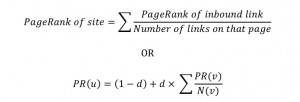Will outbound links reduce the PageRank?
essays:
http://www.dailyblogtips.com/linking-out-google-pagerank/
https://prchecker.net/what-are-the-effects-of-outbound-links-on-your-pagerank.html
Both two essays I read are talking about the effect of outbound links for PageRank of a website. Some people may have the misunderstanding of PageRank and think about it as a bucket with water. They treat PageRank as the water, inbound links as streaming of water, and outbound links as the leaking of water. In that way, the outbound links are bad to the PageRank since the more outbound links a page has, the more water it will leak. However, it is not the case. Suppose this analogy is correct, pages with a lot of outbound links will leak all the water, which is not reasonable. Reconsider the PageRank algorithm, which is shown in the picture (from www.practicalecommerce.com). The value of PageRank depends on a page’s inbound link, including the quantity and quality. It is reasonable. Since PageRank can judge the value or importance of a page (call A), more pages link to A and more important these pages are can increase the importance of page A. These essays also talked about the dangling link, which is the page without outbound links. It only takes values from other pages without any contribution. To solve this problem, those links are removed from the database under consideration, firstly and then get the assigned value recursively. Of course there is the case of PageRank leak, which means you lose the change that some pages link to your website. However, it is trivial. Thus, generally speaking, outbound links don’t directly reduce the PageRank on your pages.
The discussion about outbound links is related to the PageRank algorithm closely, which has been talked in the class. We have learned the steps of PageRank calculation from class. These two essays provide more details about how it woks and offer varied aspects and cases of it. Why we need to consider the outbound links. Let’s think about the Basic PageRank Update Rule we learned in class: each page divides its current PageRank equally across its outgoing links and passes these equal shares to the pages it points to. Intuitively speaking, each page distributed its value to outgoing links. However, when we consider the PageRank in the new iteration, the value is only depends in its inbound links, which is similar to the process of collection. In this way, it is easier to understand the whole algorithm. The analogy of distribution step and collection step can avoid the misconception.

